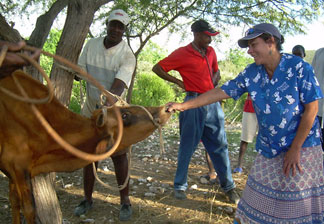Alumna veterinarian volunteers for Haiti animal project

Vermont veterinarian Karen Anderson, a 1982 graduate of Cornell's College of Veterinary Medicine, spent almost two weeks in northwest Haiti last year helping to spread knowledge about caring for and treating animals.
From Oct. 20 to 30, Anderson traveled to Haiti, creating the Animal Healthcare Training Project to visit local villages and meet with agricultural extension workers, veterinary agents and local farmers to combine veterinary training with animal-care clinics.
A resident of Mad River Valley in Fayston, Vt., where she owns the Mad River Veterinary Service, Anderson was approached by fellow resident Elizabeth Sipple last year about creating an animal care project in Haiti.
Sipple had been working on various volunteer projects with the international service organization AMURT (Ananda Marga Universal Relief Team) on the outskirts of Port Au Prince, Haiti, for several years. A subunit of AMURT is AMURTEL (Ananda Marga Universal Relief Team Ladies), which is managed by women and initiates programs to raise the standard of health and education of women and children.
With organizational help from AMURTEL, Anderson, Sipple and other volunteers spent time in Anse Rouge, Haiti, training animal-care agents in surgical procedures, medicinal dosage measurement and birthing procedures for animals. There are no veterinary schools in Haiti.
Anderson also helped train workers on how to administer antibiotics and immunizations, give physical exams and how to properly restrain animals.
In a letter to the editors of the Valley Reporter newspaper, Sipple wrote, "Animals play a crucial role in the subsistence lifestyle of the people of Anse Rouge, and working to improve animal health and animal care practices is a sustainable solution for poverty reduction."
During her 10 days in Haiti, Anderson saw more than 400 animals and provided each with wormers and vaccines. Money raised for the volunteer project, in part through a fundraiser that Anderson had organized earlier that year, paid for digital thermometers, penlights, stethoscopes, antibiotics and a veterinary reference book for the agents Anderson helped to train.
"I hope we left enough knowledge and tools so the attendees will be able to follow up and carry on," Anderson said. "We hope to identify other individuals interested in volunteering for, or making donations to, this remarkable organization."
This story was adapted from a Nov. 21, 2007, article by Kara Herlihy of The Valley Reporter of Mad River Valley, Vt.
Media Contact
Get Cornell news delivered right to your inbox.
Subscribe